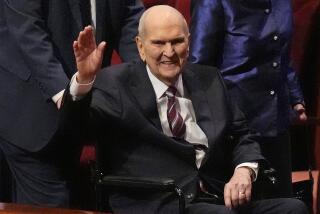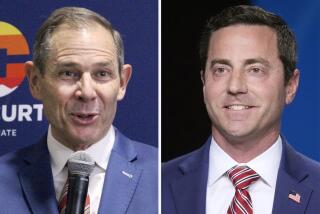Mormon Church tries to balance gay rights protections, religious freedom
Seven years after the Mormon Church led followers on a campaign to outlaw gay marriage in California, church leaders on Tuesday announced their support for job, housing and public accommodation protections for gays and lesbians everywhere.
But in calling for a “fairness for all” approach, the church also insisted on exemptions for religious freedom, such as laws to protect Mormon doctors who refuse to perform abortions or to assist with artificial insemination for lesbians.
The announcement, at a rare news conference in Salt Lake City that featured three members of the church’s governing Quorum of the Twelve Apostles, was greeted with cheers and skepticism — a reflection of the complex and often divisive debate over how to balance gay rights and religious freedom.
Sarah Warbelow, legal director of the Washington-based Human Rights Campaign, the nation’s largest civil rights organization for lesbian, gay, bisexual and transgender people, said the church’s position appeared “deeply flawed” as public policy.
“Symbolically, seeing the church leaders advocating so openly for these protections will no doubt be deeply meaningful to Mormon families with LGBT members, and provide encouragement to LGBT youth in the church,” Warbelow said in an emailed statement. But, she added, “nondiscrimination protections only function when they are applied equally.”
Some groups, such as Equality Utah, an advocacy group for gays and lesbians in a state with nearly 2 million Mormons, lauded the announcement.
“Many within the LGBT community are themselves people of faith,” Executive Director Troy Williams said. “We look forward soon to the day when all Utahns have the opportunity to live and work freely in the state we call home.”
The church’s announcement comes as the U.S. Supreme Court is expected to rule this year on the constitutionality of same-sex marriage.
The court has grappled with high-profile cases involving the boundaries of religious liberty, with complicated results.
In the Hobby Lobby case last year, it ruled that a Christian business could refuse to provide comprehensive birth-control coverage to employees mandated under the Affordable Care Act. In another case, it rejected the appeal of a New Mexico photographer accused of flouting anti-discrimination laws by refusing to photograph a same-sex wedding.
Jonathan Roberts, 38, of Hollywood, a former Mormon missionary, described the announcement as a “calculated” and “patronizing” bit of public relations on the part of a church that sees increasing cultural acceptance of gay people and doesn’t want to look bigoted.
Roberts, who is gay, said church leaders were secretive about why they made decisions, but he suspected the announcement was a “preemptive strike” in anticipation of the Supreme Court ruling.
The Mormon Church has an estimated 15 million followers worldwide, with about 6 million in the U.S., where the largest temples are in Salt Lake City — the church headquarters — Los Angeles and Kensington, Md. California has about 768,000 members.
In 2008, the Mormon Church urged followers to give their time and money to help pass Proposition 8, the California measure to ban same-sex marriage, which narrowly passed.
The courts struck down the measure, and the church faced heated protests — including protests against individual donors to the campaign — that equated Proposition 8 with bigotry.
The proposition’s passage was the catalyst for talks between LGBT and Mormon leaders about ways to improve relations, and “the more moderate Mormons were hoping to try and make things better,” said Lorri L. Jean, chief executive of the Los Angeles LGBT Center, which organized protests against the measure.
At Tuesday’s news conference, the church elders emphasized that their opposition to same-sex marriage had not changed. Mormons believe sex is only permissible in marriage between a man and a woman.
Jerry Garns, one of the eight top Mormon leaders in California, said Mormons did not see the church position against same-sex marriage as discrimination.
“I think everyone has someone, a friend, a family member, who is touched by this issue, so of course we discuss it,” he said. “There’s no real change with the doctrine, but finding a way forward that is harmonious is what we all want.”
Patrick Mason, director of the Mormon studies program at Claremont Graduate University, said the church appeared to have given up the battle against same-sex marriage laws.
“They have tried to walk a fine line, saying that because of our theological commitments, we can’t accept same-sex marriage, but let’s agree to work together on this whole raft of other issues,” Mason said.
“This statement is kind of an olive branch saying can we find a way to accept religious liberty and at the same time promote equal and fair treatment of citizens,” he said.
Despite the softer approach by the church, some LGBT advocates were skeptical that the announcement represented a meaningful shift.
Jean said the church’s insistence on “religious exemptions” was a recipe for discrimination.
“The exceptions they want are big enough to drive a truck through,” she said. “No one should be fooled by this.” She described it as a “non-statement statement that is basically, ‘We don’t think LGBT people should be discriminated against unless we believe they should be discriminated against.’”
But the church’s announcement could help spur change in some conservative states with large Mormon populations.
In Utah, legislators could face easier going with a proposal to add sexual orientation and gender identification to the state’s anti-discrimination statutes. In previous years, similar legislation has failed to pass.
In Idaho, the House State Affairs Committee is holding hearings on whether to add “sexual orientation” and “gender identity” to a state law barring discrimination in employment, housing and public accommodations.
Johnny Townsend, a Seattle author who said he was excommunicated from the Mormon Church a generation ago for being gay, sounded cautiously hopeful.
“I think the church is very slowly coming around to realizing it will have to have a kinder, gentler approach to gays and lesbians,” Townsend said. “They realize they have to make concessions. I think it is a step forward. But so many of the Mormons I know have very strong anti-gay feelings, and it will take more than this to soften them up.”
Times staff writers Maura Dolan, Maria L. La Ganga, Lauren Raab and Kurtis Lee contributed to this report.
More to Read
Sign up for Essential California
The most important California stories and recommendations in your inbox every morning.
You may occasionally receive promotional content from the Los Angeles Times.













